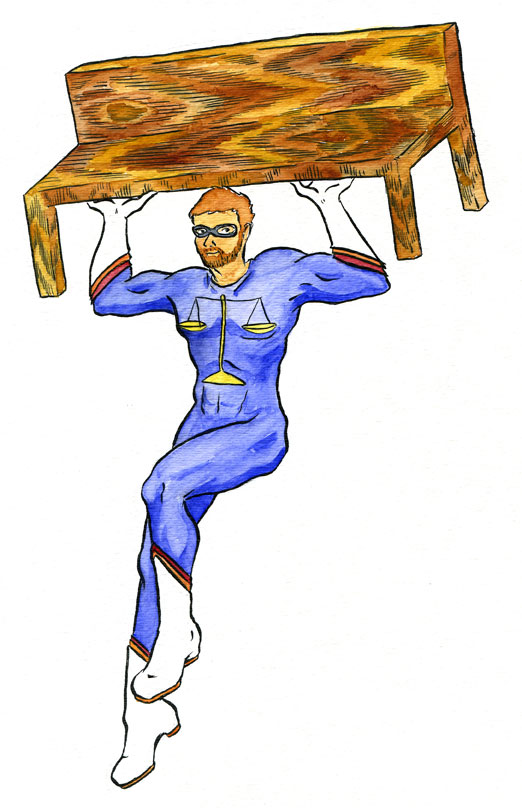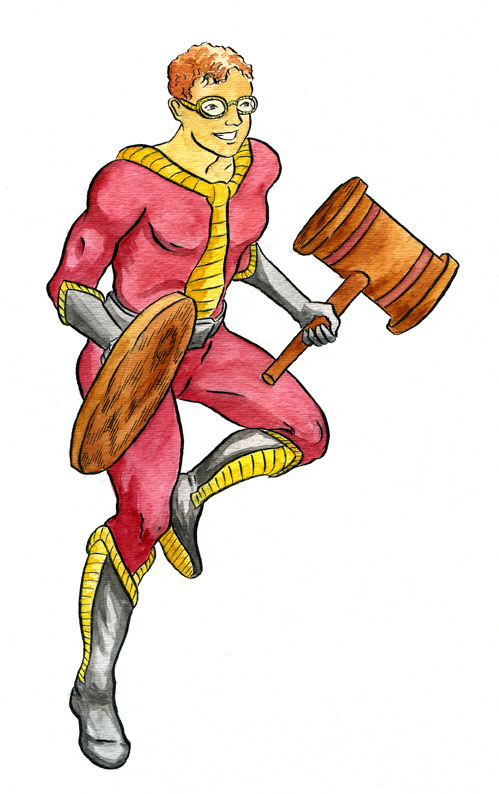Ever since their autumnal launch of Law and the Multiverse, James Daily and Ryan Davidson, two stalwart attorneys licensed to practice law in Missouri and Indiana respectively, have used not a brush or nib but the digital pen to question what many fates are in store for superheroes should the law of our land ever catch up to theirs. What might seem like a school lecture is actually an enriching conversation full of ‘what if’s and delivered with the sincerity of a eulogy. The caped situations are approached in such a deadpan manner using precedence from past cases and our own bill of rights, that ignites a chuckle from within and likewise sets to rest those niggling questions that often pop up when one flips the pages of a floppy comic.
James and Ryan were nice enough to agree to a Skype interview with THE BEAT recently so they could answer a few questions of mine.
Jen: So, considering you are both working and living in two different states how did you meet?
James: I joined Metafilter in 2005 so I had been on there for quite a long time and had known Ryan (who joined in 2008) through the site at least through a year. We had talked briefly on other occasions before the idea of the blog came out.
Jen: How long does it take to write an article for Law and the Multiverse?
James: It really varies a lot. For those topics that are close to our day jobs it doesn’t take that long at all. For that Batman patent article, I banged it out in definitely no more than an hour. There are definitely ones that take 2-3 hours.
Jen: From what I understand and as is often the case with the internet, you two have yet to meet in person?
Ryan: That is correct, we’ve talked on the phone a couple times.
James: There have been some times we had serious conversations and for those we went to the phones
Jen: How old were you when you started reading comics?
James: No older than 11 for sure because we moved towns around that age. I definitely remember going to the store to buy comics in the town I moved from and I had been reading for a year or so before then.
Ryan: I didn’t really grow up with comic books but I had been reading science fiction since second grade. I just killed the entire science fiction section of the library. Comic books are a more recent pick up. I think the first thing I read all the way through was Civil War in pretty much every continuity. Then Watchmen, I’ve been getting into Frank Miller.
Jen: While unlike superheroes you might not have a single moment in time that made you want to be an attorney, what drew you to that profession?
James: I have a technical background in computer science, BA and Master’s in it, so I went to law school to be a patent attorney. I do represent clients in patent manners but my day job is an academic legal researcher with a project in commercializing innovation which as the name might suggest deals a lot with patent law. In response to a specific moment, that I couldn’t say.
Ryan: I had knocked around the idea of being an attorney during high school and in college I took philosophy and history as an undergrad. Then I toyed with other things, spent a year teaching before going to law school kind of like I had always planned.
Jen: If you had a superpower what it would be? Would it be untraceable by the state?
James: Being an attorney, you are sort of inclined to break the rules of the question and go for omnipotence or the like. One of the things attorneys tend to do when asked any question is immediately think what is the most extreme possible thing I can get away within the bounds of the question but more realistically something like flight or the more classic powers like that. FLIGHT!
Ryan: I think I would have to go with a mutant healing factor like Wolverine because you get the bonus of longevity.
James: GOOD ONE!
Jen: Do your favorite superhero characters have those powers as well or is there a character flaw in them that you appreciate?
James: My wife can tell you this, I’m not the best person for superlatives so questions with ‘best’ and ‘favorite’ are hard for me. But Wolverine is definitely a classic favorite character of mine from the Marvel Universe and in DC, I have to go with Batman.
Ryan: I’m just partial to the X-Men stories and it has been my favorite contact with the comic book worlds. And I got a huge kick out of the Civil War stories so it’s hard to say.
Jen: Do you have a preferred attorney in comics? She Hulk, Daredevil, Manhunter?
James: I’m actually trying to hunt down some Manhunter issues because I’m a fan of well-written female characters and I understand that she is one.
Pictured below: Ryan Davidson
Jen: I have some legal questions.
James: We can’t give you any legal advice!
(Nervous laughter from ALL of us)
Jen: Thank you, more like because of comics and movies like Watchmen and PIXAR’s The Incredibles, what are your opinions on the supers/capes being agents of the state and then stripping them of their official powers?
James: Writers can tell stories however they like so it’s hard to say “oh no, that’s totally unrealistic.” from a real perspective. It’s likely, for example, that what happened in Watchmen could probably happen whether superheroes were real or we just have a vigilante problem. In the case of the Incredibles, yeah, what happened was reasonable given the amount of damage that happened (in cities).
Ryan: Part of the play here is that we are trying to talk about very realistic details about books and stories that are inherently unrealistic. The fact that we can push them as far as we do is a testament to the creativity of the authors and the robustness of the legal system.
James: Yes, sometimes the stories hold up surprisingly well through legal scrutiny.
Jen: When I was watching the Incredibles, that’s all I could think about was all the car damage being done.
Ryan: Ha, yes, State Farm is NOT going to be happy about this.
Jen: What about abortion? Is each super sperm special?
James: We at Law and the Multiverse do not hesitate at the tough issues.
Jen: So if you are dealing with a super who can erase memories or even has the sperm-power of Zeus, as in you can impregnate someone with a shaft of light or as a shape-shifter how can you prove if you have been raped?
Ryan: I’m not sure that brings up any questions about abortion but about paternity is sure going to be a fun discussion there.
Jen: Well, if to say a woman or male wants to the baby to be aborted, would they be considered human, superhuman, would it depend on each state court?
James: I think it depends on the superhero you are talking about. If you’re talking about the X-Men, the current canon suggests that it’s just one gene, the X gene, that makes the difference there so they are clearly human. But there are others that are less obviously human and it can get tricky there. I know Kryptonians can have children with humans so they may have a tougher argument.
Ryan: And here’s actually another question, what happens if the woman tries to have an abortion and it doesn’t work?
JEN: EXACTLY
Ryan: I mean, how do you abort Wolverine? That’s just not going to happen.
James: That is a good point, it might be um, well..
Jen: Uterine removal?
James: Yeah, you might have a hard case there.
Ryan: But again, I don’t think it is as much as legal case as ‘good luck with that.’
Jen: So with the Bureau of Amplified Animals of the DC universe with characters like Detective Chimp, how would animals with human intelligence be tried if they could be in our legal system?
James: There have been some interesting cases in the real world involving animal who are brought in as witnesses. In particular there have been cases where a parrot, not the same parrot in each case, has been brought or attempted to brought as witnesses because the parrot is saying things like “No, don’t hurt me, Jim” or whatever. And then they are arguing that that is essentially a recording of the deceased person’s speech. And, of course, it turns out if you analyze it from a legal point of view, there’s lots of problems like even if you are willing to put them on the stand, just what they are trying to offer as testimony if they were a person (there are lots of problems with that). So I think if animals could be brought as witnesses perhaps, if they can enter in to the legal system that way, then they could probably be tried for crimes.
Detective Chimp in his most recent appearance in Shadowpact
I think that the animals involved, like if Detective Chimp commits a crime, would much prefer to have access to the legal system and all the rights of a defendant than to be just be declared a simple animal and presumably be put down by his owner or whatever the state decides his owner was. So, non-intuitively, intelligent animals would probably want to considered like humans even in a criminal case, they’d want to be tried because the alternative is actually worse.
Ryan: How the legal system treats non-human intelligences is actually a fairly fertile morality tale for authors who want to talk about things like racism and homophobia. We see this in Battlestar Galactica and superhero books all the time. And so it just depends on what kind of of morality tale someone wants to tell combined with how optimistic the author actually is about human society and morality. That may have as big effect on the outcome as anything else.
James: True, an interesting twist on that is cases like Brainiac where you have essentially a robot who is intelligent rather than a living creature. Well, is Braniac alive, is a question within itself.
Ryan: Biologically.
James: Yes, it isn’t biological at least. So you have a third possible category, humans or certainly human-like, such as Kryptonians, animals who are amplified or mutated or gained intelligence that their species wouldn’t normally have, and then you have totally artificial constructions and they have to be treated differently as well.
Ryan: I can see some In-universe attorney whipping out the 14th Amendment about discrimination on the basis of race and saying “well it doesn’t say human, just race.” I’m not sure I’d want to have to ARGUE that but it’s in the law!
James and I have found that what started as a let’s take a superhero and talk about their legal issues has almost transformed into let’s think of a legal issue and throw a superhero in. It almost doesn’t matter what legal issue we come up with, some superhero will be impacted by it.
James: Even something you really wouldn’t think about, like securities fraud, it turns out that someone like Bruce Wayne or Lex Luthor would be impacted by that stuff. Depending on what they do or don’t know their business is doing versus what they do or don’t know as Batman or Lex Luthor the supervillain. Just about anything you can think of has good comic books hooks.
Jen: So now you think of a legal issue and try to match it up with a superhero. To stay on top are you currently both reading comic books at the same time, floppy wise or trades? Are you going back and reading DC/MARVEL Archives?
Ryan: For the first part of the question, I do both. Sometimes I’ll take a superhero, I’ll think of a legal issue. Whichever comes first.
James: I’d like to make the point is that the whole blog was inspired because we thought of what happened in comic books and certain events created legal events. Super powers…is that a weapon maybe?! But you don’t have to try and fish for common comic book powers and tropes, you can go the other direction too and take a legal direction out of the air and find how it fits into the comic book world. We haven’t necessarily shifted form one direction or the other but that it can go both ways.
Given that I have a day job and a family, I tend to read trade paperbacks and graphic novels rather than have a pull list at the local comic book store. Then I can do all my reading at once. But there are some individual issues, little one offs that I’ll pick up as soon as they come out like the Doctor Horrible series.
Ryan: I’m definitely in the same category, I’m coming from behind and absorbing large collections as fast as I can get my hands on them. Reading a bunch of comics books is always something I wanted to do and now I have the perfect excuse.
Jen: Have you gone back to read any pre-code super hero stories?
James: No, we haven’t because our audience is so diverse. Some people reading our blog come at it from the comics angle and find this an interesting way of looking at comic situations or some are lawyers who find this as an interesting way to look at law. SO we basically have two kinds of niches and so as a result we tend to speak in general terms, broadly accessible. So when we speak about Batman or Superman we are thinking about the general conception of Superman or Batman especially with the movies or animated series in mind. Going back to the pre-code stories, that might fall out of the general public’s idea of what they think of [as classic superheroes].
Ryan: Yes but that might be fertile ground for interesting discussions since things were obviously a lot less sanitized back then. So it’s probably worth looking at if only to find some issues that might not show up later.
Pictured Below: James Daily
Jen: Would you like to speak at conventions? I’m sure there is a growing need and curiosity for you.
Ryan: That would be fun!
James: Yeah, we wouldn’t mind that. I haven’t been to a comic book convention yet but I have been to a Star Trek convention. At which there was necessarily a fair comic book component, there is a cross-over. I didn’t dress up but I got to see William Shatner speak and that was fun.
Ryan: I stuck my head into Otakon a couple years ago and that was an experience.
Jen: Have you thought about integrating your work/applications into law school course instruction?
James: We had a commenter on the blog, a professor at Columbia Law School, who loved the blog and he wrote he would have to use it in his classes. We’ve had comments from other other law school professors like from Georgetown, one in particular claimed she loved it as well so it may find it’s way into other law classes. While I don’t think either of us are personally in a position to do so, if invited to give a lecture we certainly would not say no.
Ryan: It’s possible that student organizations at law schools could start sending invitations and we could do a certain amount of traveling, I would certainly go to my alma mater which is only two hours away.
James: I live in a city with TWO law schools, including the one I went to (Washington University in St. Louis School of Law) so I wouldn’t turn down an invitation from both.
Jen: So when is the book coming out?
(Laughter)
Ryan: We started this as two guys doing blog having fun and about three weeks later we were in the NY Times.
Jen: So you might need a few more posts.
Ryan: Probably.
James: Actually, we’ve been approached by several publishers and are shopping around a book proposal. Ryan and I hope to have a book deal closed soon. We definitely hope that the blog and any book would take the tack of using superheros as a framework, as an example, as an entertaining way to talk about the law in a way that is accessible and interesting. And we think that a book is a good way to address that plus we like the aspect of geeking and overanalyzing/overthinking things in true comic book geek fashion.
Ryan: Neither one of us would have gone to law school if we didn’t like doing that anyways.
Indeed! I’d like to thank Ryan and James for answering my oh-so compelling questions and encourage you to please visit Law and the Multiverse to quell legal questions you might have with a superhero taking off their mask in court or other such problems. An email address is posted now so that you too can ask a question. A special thank you from me to Tom Howe, a fearsome attorney from the State of Texas and comics enthusiast, for pointing me towards Law and the Multiverse back in November. For those of you on the go, follow James and Ryan’s updates via their Twitter feed.
==========
Jen Vaughn is a master unicorn wrangler and a cartoonist. When not bothering or drawing hard-working attorneys, she works as the night librarian at the Schulz Graphic Novel Library.












Are the author’s aware of a similar column that used to run in the Comic Buyer’s Guide called “The Law Is A Ass” which covered exactly this kind of serious critique of actual law and superheroics? It ran in the mid 1980s or so. It would be worthwhile to track down that precedent! I think it had a column about Watchmen if I remember right.
Here’s Bob Ingersoll’s column: The Law Is A Ass, looks like he continued working on it up until 2003!